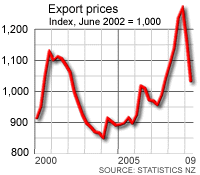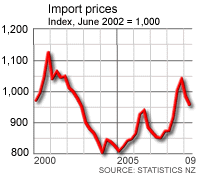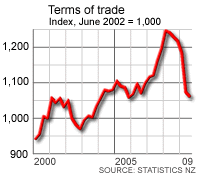 New Zealand's merchandise export prices fell 8.2% in the March quarter from the December quarter, the biggest quarterly fall in over 50 years, figures from Statistics New Zealand (Stats NZ) show. Merchandise import prices fell at a slower rate of 5.4%, with New Zealand's merchandise terms of trade index falling 3% in the first quarter of 2009.
Despite the fall in prices, seasonally adjusted export volumes rose 2% in the March quarter, the first rise since the December 2007 quarter. Dairy product exports were the major contributor to the rise, Stats NZ said. Seasonally adjusted import volumes fell 9.8% from December and were at their lowest level since December 2004.
"The latest quarterly fall in merchandise export prices was mainly driven by lower prices for food and beverages, particularly dairy products, and for petroleum and petroleum products," Acting Government Statistician Dallas Welch said.
"The dairy products index fell 20.5% in the March 2009 quarter, the largest quarterly decrease since the series began in the March 1950 quarter. The latest quarterly decrease compares with increases of 5.5% in the December 2008 quarter and 7.4% in the September 2008 quarter," Welch said.
New Zealand's merchandise export prices fell 8.2% in the March quarter from the December quarter, the biggest quarterly fall in over 50 years, figures from Statistics New Zealand (Stats NZ) show. Merchandise import prices fell at a slower rate of 5.4%, with New Zealand's merchandise terms of trade index falling 3% in the first quarter of 2009.
Despite the fall in prices, seasonally adjusted export volumes rose 2% in the March quarter, the first rise since the December 2007 quarter. Dairy product exports were the major contributor to the rise, Stats NZ said. Seasonally adjusted import volumes fell 9.8% from December and were at their lowest level since December 2004.
"The latest quarterly fall in merchandise export prices was mainly driven by lower prices for food and beverages, particularly dairy products, and for petroleum and petroleum products," Acting Government Statistician Dallas Welch said.
"The dairy products index fell 20.5% in the March 2009 quarter, the largest quarterly decrease since the series began in the March 1950 quarter. The latest quarterly decrease compares with increases of 5.5% in the December 2008 quarter and 7.4% in the September 2008 quarter," Welch said.
 "This quarter's fall was driven by price decreases for whole milk powder (down 20.1%), skimmed milk powder (down 24.1%), cheese (down 19.9%), and butter (down 30.3%). In the year to the March 2009 quarter, the dairy products index fell 10.0% compared with a rise of 63.3% in the year to the March 2008 quarter. The latest annual decrease is the largest since a 13.9% decrease in the year to the June 2003 quarter," she said.
Food and beverage prices fell 8.4% from December, and was the most significant contributor to the overall fall in export prices, Welch said. The fall followed increases of 6.5% and 8.4% in the December and September 2008 quarters, respectively. Petroleum and petroleum products prices fell 28%.
"The merchandise import price index fell 5.4% in the March 2009 quarter, following rises of 3.5% in the December 2008 quarter and 9.6% in the September 2008 quarter," Welch said.
"This quarter's fall was driven by price decreases for whole milk powder (down 20.1%), skimmed milk powder (down 24.1%), cheese (down 19.9%), and butter (down 30.3%). In the year to the March 2009 quarter, the dairy products index fell 10.0% compared with a rise of 63.3% in the year to the March 2008 quarter. The latest annual decrease is the largest since a 13.9% decrease in the year to the June 2003 quarter," she said.
Food and beverage prices fell 8.4% from December, and was the most significant contributor to the overall fall in export prices, Welch said. The fall followed increases of 6.5% and 8.4% in the December and September 2008 quarters, respectively. Petroleum and petroleum products prices fell 28%.
"The merchandise import price index fell 5.4% in the March 2009 quarter, following rises of 3.5% in the December 2008 quarter and 9.6% in the September 2008 quarter," Welch said.
 "The latest quarterly fall is the first since the September 2007 quarter, even though the New Zealand dollar depreciated, which has an upward influence on prices. The decrease was mainly driven by lower prices for petroleum and petroleum products, which was partly offset by price increases for machinery and for transport equipment," she said.
"When petroleum and petroleum products are excluded, the total import price index increased 2.8% in the March 2009 quarter."
The Trade Weighted Index (TWI) of the New Zealand dollar fell 7.1% in the March quarter, Stats NZ said.
Despite the falls from December, export prices were still up 6.7% from the March quarter last year, the sixth consecutive quarter of year-on-year growth, albeit the slowest of the six. Import prices were up 12.6%, with the merchandise terms of trade down 5.2%.
ASB economist Jane Turner said that the rise in export volumes, and the fall in import volumes would have a positive impact on GDP in the March quarter.
"With export volumes up 2% and import volumes down almost 10% net exports is likely to make a positive contribution to GDP over Q1. However, this will be more than offset by the decline in consumer spending and investment and we are expecting GDP to decline 0.7%. Although export volumes remain supported by strong agricultural production (in particular dairy), weak global demand has seen prices fall considerably and disappointing export incomes are likely to remain a drag on GDP over the next year," Turner said.
"The latest quarterly fall is the first since the September 2007 quarter, even though the New Zealand dollar depreciated, which has an upward influence on prices. The decrease was mainly driven by lower prices for petroleum and petroleum products, which was partly offset by price increases for machinery and for transport equipment," she said.
"When petroleum and petroleum products are excluded, the total import price index increased 2.8% in the March 2009 quarter."
The Trade Weighted Index (TWI) of the New Zealand dollar fell 7.1% in the March quarter, Stats NZ said.
Despite the falls from December, export prices were still up 6.7% from the March quarter last year, the sixth consecutive quarter of year-on-year growth, albeit the slowest of the six. Import prices were up 12.6%, with the merchandise terms of trade down 5.2%.
ASB economist Jane Turner said that the rise in export volumes, and the fall in import volumes would have a positive impact on GDP in the March quarter.
"With export volumes up 2% and import volumes down almost 10% net exports is likely to make a positive contribution to GDP over Q1. However, this will be more than offset by the decline in consumer spending and investment and we are expecting GDP to decline 0.7%. Although export volumes remain supported by strong agricultural production (in particular dairy), weak global demand has seen prices fall considerably and disappointing export incomes are likely to remain a drag on GDP over the next year," Turner said.
NZ merchandise export prices fall by most in over 50 years
NZ merchandise export prices fall by most in over 50 years
10th Jun 09, 1:01pm
by

We welcome your comments below. If you are not already registered, please register to comment
Remember we welcome robust, respectful and insightful debate. We don't welcome abusive or defamatory comments and will de-register those repeatedly making such comments. Our current comment policy is here.